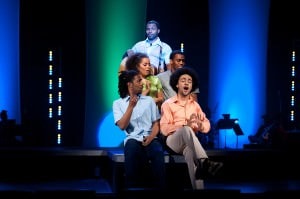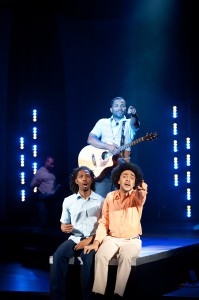To be marginalized for being Black is one thing. To be marginalized for being different and Black is another. Stew and Heidi’s semi-autobiographical rock musical Passing Strange directed by Eric Ruffin, examines this idea through song, dance and quite a bit of humor.
This musical, like the protagonist Youth (Galen Williams), breaks the conventional mold and takes a chance with new, innovative ways to tell a story on stage. Youth is a young Black man who lives with his Mom (an absolutely stellar Te’La Curtis Lee) in southern California. Mom encourages Youth to attend church and attempt to fit in with all of other teenagers in the congregation. Youth tries but fails and determines that the life his mother created for them is not enough, and he embarks on a journey to Europe in a quest to find “the real.” What occurs in Youth’s life while in Amsterdam and Berlin is only part of the plot. The most telling scenes are those at the church and with his mother. Youth is forced into a tiny box, and his urgency to escape it leads him to make decisions that affect him for the rest of his life.
Passing Strange was nominated for seven Tony Award nominations, including Best Musical and Best Original Score, when it debuted on Broadway in 2008, and won one for Best Book of a Musical. Critically acclaimed film director Spike Lee made a documentary of the same title, which premiered at the 2009 Sundance Film Festival. And watching these performers at Howard University recreate the production, it’s easy to see why it made such an impression.

Most of the performances are brilliant, especially from Lee as Mom and Tyree Young as Mr. Franklin/Joop/Mr. Venus. Lee virtually shines in this role. She carries with her a forced optimism that her son will soon become who she wants him to be, while fear, uncertainty, concern and worry line the corners of her wavering smile and trembling lips. The tears gather and patiently wait to fall, but it is as though Mom is determined not to weep for what she cannot control. To portray a character like this takes a considerable amount of nuanced poise and Lee owns it. I never forgot that she was lingering in the shadows, waiting for her son to come home.
Young’s portrayal of Mr. Franklin and Mr. Venus nearly steals the show. His Mr. Franklin is a trapped soul who uses music in church and considerable amounts of marijuana to cope with the fact that he didn’t have the guts to get up and get out. Young is nearly perfect as Mr. Venus, a German whose music topples the traditional song of verse/chorus/verse/bridge/ chorus, performs “Surface” while strutting along the aisles and across the stage in 3-inch black knee high boots and gives the crowd wild looks with wide, frightening eyes. I was actually a little scared of this guy. There’s a future in show business for these two.
The Narrator (an effective Anthony Manough) carries the weight of the show and does it quite well. This is due to Manough’s rich singing, his penchant for sarcasm and just the right touch of comic timing. The rest of the cast, Brandyn Ashley (Edwina/Marianna/Sudabey), Aurie Ceylon (Sherry, Renata/Desi) and Julius Williams (Rev. Jones/Terry/Christoph) hold their own, though Ceylon is fares better when a part of the ensemble. Her voice, though beautiful, is soft, timid even. She gets drowned out by the music and the richer tones of Manough and Heidi (Soneka Anderson).
The show stalls a bit when Youth is in Berlin attempting to persuade his new comrades to let him stay. The ‘I’m from South Central and I’m a gangsta’ bit seems forced with Williams at the helm, and the scene suffers as a result. A fair amount of scenes are overly-preachy, especially when Youth mocks his mother’s belief system and distances himself from the church. The marijuana induced conversations between Youth and Mr. Franklin also seem a bit strained. Youth drags out, “I don’t believe in God.” Mr. Franklin’s retort of, “Does he know?” leads to a mini-sermon about being yourself and breaking the mold, and escaping the trappings of a mundane life. There must be several ways to say ‘keep it real!” “be you!” and, at times, this musical tries to disclose all of them.
The musical numbers (played by a five piece band) are powerful to say the least. Standout songs include “Church Blues Revelation,” “Music is the Freight Train in Which God Travels,” We Just Had Sex,” and “May Day.” Most of the songs are accompanied with dance and there’s Princess Mhoon Cooper to thank for the phenomenal choreography. The ensemble jumps, hops, steps, shouts and curve their bodies in unimaginable ways, eliciting yelps and cheers from an ecstatic audience. Cooper’s vision is unique, and the choreography is the most compelling in the scenes in the church and when Youth moves to Berlin. The ensemble speeds through the aisles filled with what is assumed to be the Holy Spirit in Act one and seemingly perfects the German military march in Act two.

This production team is impressive with set design by Micheal C. Stepowany, immaculate colorful costumes by Reggie Ray along with Theryn Knight’s lighting. Steopwany’s set is an elaborate foray of curtains and shades. Tall, willowy sheets line the walls and change from lavender in the first act to white and twisted with intricate knots in the second. Ray’s costumes are bright, divine looking dresses and slacks along with leathered soldier gear and mohawks. Knight’s lighting is most effective during the shadowy scenes with Mom and the brighter ones in the church. The urgency of Berlin’s revolution is thoroughly captured and this is surely due to Knight working her magic.
Theatre students at Howard rarely disappoint and this musical is no exception. Now it’s your turn to seek out ‘the real.’ You just might find it if you go witness this show.
Running Time: 2 hours with a 10 minute intermission.
Passing Strange runs from March 7 -10, 2012 at Howard University’s Ira Aldridge Theatre – 2455 6th Street, NW, in Washington, D.C. For tickets, call (202) 806-7700, or purchase them online.




